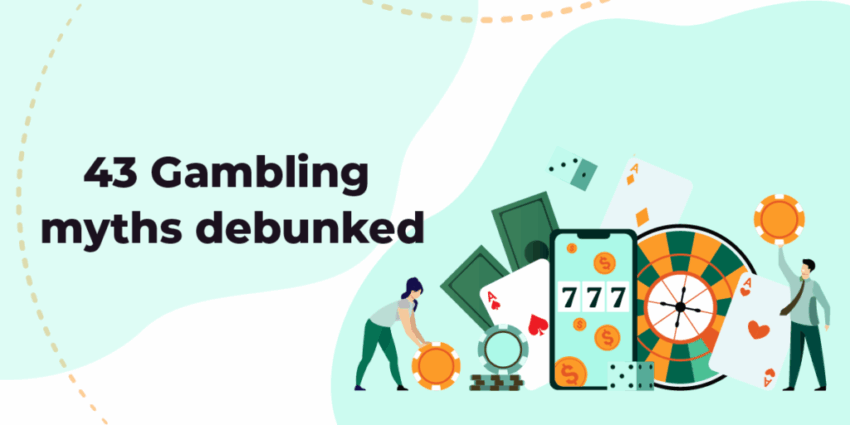Gambling misconceptions have long clouded the enjoyment and understanding of this popular leisure activity, impacting the choices of millions of players worldwide. Many individuals fall prey to gambling myths, believing they can manipulate the outcomes of games or that they possess strategies to defeat the house edge. This post aims to clarify prevalent misunderstandings, such as the gambler’s fallacy and the role of random number generators, in order to enhance online gambling safety. By debunking these myths and shedding light on the realities of gambling, we hope to foster a more informed and responsible gaming environment. Ultimately, understanding the true nature of gambling is essential for players looking to navigate this thrilling landscape wisely.
The realm of betting and wagering, often referred to as gambling, is rife with various misconceptions that can lead individuals astray in their gaming experiences. From the fallacy of skill affecting random outcomes to the notion that players can change the inherent house edge, these gambling myths can skew perceptions of luck and strategy. Understanding key concepts like random number generators and the chances of winning is vital for both novice and seasoned gamblers. Additionally, enhancing online gaming safety by being aware of these myths can protect players from making ill-informed decisions. As we explore these prevalent beliefs, it becomes increasingly important to grasp the fundamentals of gaming for a more enjoyable and responsible gambling experience.
Understanding Gambling Misconceptions: Separating Fact from Fiction
Gambling misconceptions are prevalent, often leading many to believe in myths that can distort their understanding of this popular pastime. For instance, some players operate under the illusion that they can influence random number generators (RNGs) in games like slots. This belief stems from a fundamental misunderstanding of how RNGs work; they generate outcomes based solely on chance, ensuring that each spin is independent of previous results. By perpetuating such myths, players risk making poor decisions that can negatively impact their gambling experience, leading to unexpected losses and emotional distress.
Moreover, another critical gambling misconception is the idea that players can change the house edge to improve their odds. The house edge is a fixed aspect of gambling games, designed to ensure that casinos have long-term profitability. Understanding that this mathematical principle cannot be altered is vital for managing expectations and avoiding feelings of frustration when outcomes don’t align with hopes. By debunking these gambling myths, players can embrace a more realistic and informed approach, ultimately enhancing their overall gambling experience.
The Impact of Educational Initiatives on Gambling Myths
Recent efforts aimed at educating the public about gambling have proven essential in combatting the rampant gambling misconceptions. Organizations are increasingly utilizing workshops, online resources, and outreach programs to disseminate factual information about the nature of gambling, including essential concepts like the house edge and random number generators. Such educational initiatives play a crucial role in transforming misguided beliefs into informed practices, thereby fostering a community of responsible gamblers who are more aware of the risks involved.
Furthermore, these educational initiatives are particularly significant as they seek to demystify the online gambling landscape. With many individuals skeptical about the legitimacy and safety of online platforms, understanding how regulated sites operate can help dispel fears and misconceptions. Information from regulatory bodies, like the UK Gambling Commission, emphasizes that licensed casinos adhere to rigorous standards to ensure player safety and fairness, thus promoting a more secure online gambling environment. Education is key, not just for individual empowerment, but also for creating a gambling culture rooted in responsibility and informed decision-making.
Frequently Asked Questions
What are some common gambling misconceptions surrounding random number generators (RNGs)?
A prevalent gambling misconception is that players can influence the results of games governed by random number generators (RNGs). Many believe that their skill can affect outcomes, especially in games like slots. However, these games rely entirely on RNGs, which produce random results independent of player skill or previous outcomes. Understanding this reality is vital for responsible gaming, as it helps players recognize that luck is the primary factor in these games.
How does the house edge relate to common gambling myths?
One of the significant gambling myths is the misconception that players can change the house edge in their favor. The house edge is a built-in advantage for the casino, ensuring profitability over time across all games, including slots and poker. Players often misinterpret strategies that suggest otherwise. Knowing that the house edge cannot be altered helps gamblers set realistic expectations and make better game choices, thus promoting more informed and responsible gambling behavior.
| Myth Number | Gambling Myth | Reality |
|---|---|---|
| 1 | Random Results Can Be Influenced by Skill | Games like slots and roulette use random number generators (RNGs), making outcomes independent of player skill. |
| 2 | Changing the House Edge | The house edge is a fixed mathematical advantage; players cannot change it regardless of strategy. |
| 3 | The Hot Streak Fallacy | Each game outcome is independent; previous results do not affect future probabilities. |
| 4 | Accessibility to Compulsive Gambling Resources | There are many resources available for problem gambling; organizations actively provide support and help. |
| 5 | The Legitimacy of Online Gambling | Licensed online casinos must comply with strict regulations ensuring fairness and player safety. |
Summary
Gambling misconceptions can lead to misunderstandings about the nature of gaming, resulting in poor decision-making and irresponsible behaviors. Understanding the realities behind gambling myths enhances player awareness and promotes a safer gambling environment. As we have explored, recognizing the power of luck over skill, the fixed nature of the house edge, and the importance of reliable resources can empower players. Furthermore, the growth of online gambling and regulatory developments highlight the need to stay informed. As players navigate this exciting yet complex world, education remains a strong ally in debunking gambling misconceptions and fostering responsible gaming practices.
